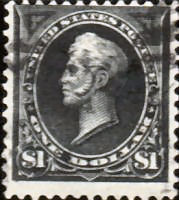![]()
Postal History Introduction
Stampless
Covers
1846
to 1900 Issues
1901-1950
Issues
1951-2003
Issues
Cancels
&
Miscellaneous
Postal
Stationery
Post
Cards
Air
Mail
First
Day &
Event Covers
Parcel Post/Special Delivery
Registered & Official Mail
Commercial & Advertising
Revenue & Postage Due
Wildlife & Game Issues
Complete List of RI Issue
| Rhode Island Stamp
Issues and Covers 1846 to 1900 The Oliver Hazard Perry $1 Issue of 1894 |
|
|
|
| 1894 Oliver Hazard Perry - Used Fine Condition - Light Cancel | |
|
Commodore Oliver Hazard Perry was born on August 20, 1785 near the village of Wakefield in South Kingston, RI. Perry became a national hero when he defeated the British squadron in the Battle of Lake Erie. Perry was appointed a midshipman at the age of 14. He served in both the West Indies and the Mediterranean until February 1813, when he was sent to Erie, PA, to complete the building of a U.S. squadron intended to challenge the British control of the Great Lakes. Prior to his assignment in Erie, Perry had served aboard the U.S. Navy ships Adams, Constellation, Nautilus, Essex and Constitution. By October of 1813, he had assembled a fleet of 10 small vessels and was ready to engage the enemy. When the battle was joined on September 10, Perry's fleet was greatly superior in short-range firepower but only slightly superior at long range. A light wind prevented Perry from closing quickly on the six British warships commanded by R.H. Barclay. When Perry's flagship, the “Lawrence,” was disabled, he transferred to the “Niagara,” winning the battle within the next 15 minutes by sailing directly into the British line and firing broadsides. Perry will always be remembered for his official report of the battle in which he stated, "We have met the enemy and they are ours." Perry's successful action at Lake Erie helped ensure U.S. control of the Northwest; it also raised him to a position of national eminence and earned him promotion to the rank of captain. He commanded the “Java” in the Mediterranean (1816–17) and a small U.S. fleet sent to the South Atlantic (1819) to bring under control certain vessels that were preying on American shipping out of Buenos Aires and Venezuela. Oliver Hazard Perry died on the return trip from South America of yellow fever on August 23, 1819. Perry's paternal great-grandfather was Oliver Hazard. The Hazard family were part of the original settlers in Rhode Island and when I was a young lad, I worked for Irving R. Hazard of Saunderstown in North Kingstown, Rhode Island. |
|
|
References: |
![]()
RI Historical
Society
The Post Offices
Home Page
RI Tercentenary Issue History
RI Philatelic Society
Recently Added Pages
Philatelic Primer
Rhode Island Around the World
Rhode Island
Town Postmarks
Other Websites of Interest
